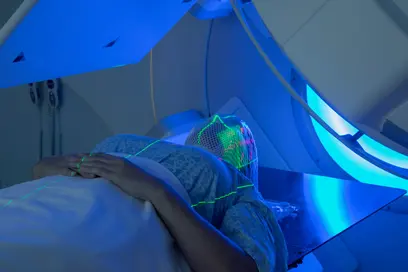Does undergoing a colonoscopy examination really reduce the number of cancers on both sides of the colon? Several studies conducted in recent years provided evidence suggesting that endoscopic examination of the colon detects primarily precancerous lesions in what is called the left ('descending') part of the colon which directly connects to the rectum. This is where most malignancies develop. However, study results indicated that colonoscopy provides almost no risk reduction for cancer of the transverse and ascending colon.
At DKFZ, Professor Dr. Hermann Brenner and his team are conducting epidemiological studies to evaluate different bowel cancer early detection methods and, thus, provide a reliable foundation based on numbers for the effectiveness of early detection examinations. Their latest study aimed to find out whether endoscopic examination of both sides of the colon actually has greater benefits than a smaller examination called sigmoidoscopy. This is an inspection of only the descending portion of the colon, which is much less troublesome for patients.
In their study based on elaborate methods, the DKFZ researchers questioned 1,688 colorectal cancer patients about past colonoscopies and their medical results over the last ten years prior to diagnosis. The same information was elicited from 1,932 controls.
From the results the epidemiologists calculated that a previous colonoscopy which included removal of detected precancerous lesions reduces the overall risk of malignant colorectal cancer by 77 percent. In a separate step, the researchers also investigated risk reduction for the individual anatomic parts of the intestine. As expected, protection from cancer of the left side of the colon was particularly high at 84 percent. But even on the right side of the colon the cancer rate among study subjects who had undergone a colonoscopy was still 56 percent lower than in those who had not undergone the procedure.
The results are evidence for the great potential of colonoscopy as a prevention tool. “However, doctors should educate their patients that although endoscopic examination of the colon provides very good protection from bowel cancer, it does not provide 100 percent safety,“ says Hermann Brenner. The epidemiologist mentions various reasons why risk reduction from colonoscopy varies in different parts of the intestine: Precancerous lesions on the right side of the colon are more easily missed, because they are often flat and inconspicuous and it is not always possible to see all parts of the right colon during the examination. By contrast, precancerous lesions in the left colon usually occur as prominent polyps. In addition, there may be differences in the biological behavior of tumor cells in the individual intestinal parts.
But why does the German study arrive at different results than similar studies conducted in other countries such as Canada? “A possible reason,“ speculates Hermann Brenner, “is that quality assurance of the examinations is a priority in Germany so that even cancer precursors are found which are hard to detect.“ When colonoscopy was introduced as part of the cancer prevention program of statutory health insurances in Germany in 2002, special precautions were taken to make sure that only highly qualified doctors are entitled to perform the examination and that the quality of examinations is under regular control.
Hermann Brenner, Jenny Chang-Claude, Christoph M. Seiler, Alexander Rickert and Michael Hoffmeister: Protection from colorectal cancer after colonoscopy: population-based case-control study. Annals of Internal Medicine, January 4, 2011
A picture for this press release is available at:
www.dkfz.de/de/presse/pressemitteilungen/2011/images/Darmkrebs.jpg
Source: Tissue section of colorectal cancer; Dr. Lutz Langbein, German Cancer Research Center
About DKFZ
With more than 3,000 employees, the German Cancer Research Center (Deutsches Krebsforschungszentrum, DKFZ) is Germany’s largest biomedical research institute. DKFZ scientists identify cancer risk factors, investigate how cancer progresses and develop new cancer prevention strategies. They are also developing new methods to diagnose tumors more precisely and treat cancer patients more successfully. The DKFZ's Cancer Information Service (KID) provides patients, interested citizens and experts with individual answers to questions relating to cancer.
To transfer promising approaches from cancer research to the clinic and thus improve the prognosis of cancer patients, the DKFZ cooperates with excellent research institutions and university hospitals throughout Germany:
- National Center for Tumor Diseases (NCT, 6 sites)
- German Cancer Consortium (DKTK, 8 sites)
- Hopp Children's Cancer Center (KiTZ) Heidelberg
- Helmholtz Institute for Translational Oncology (HI-TRON Mainz) - A Helmholtz Institute of the DKFZ
- DKFZ-Hector Cancer Institute at the University Medical Center Mannheim
- National Cancer Prevention Center (jointly with German Cancer Aid)
The DKFZ is 90 percent financed by the Federal Ministry of Research, Technology and Space and 10 percent by the state of Baden-Württemberg. The DKFZ is a member of the Helmholtz Association of German Research Centers.



